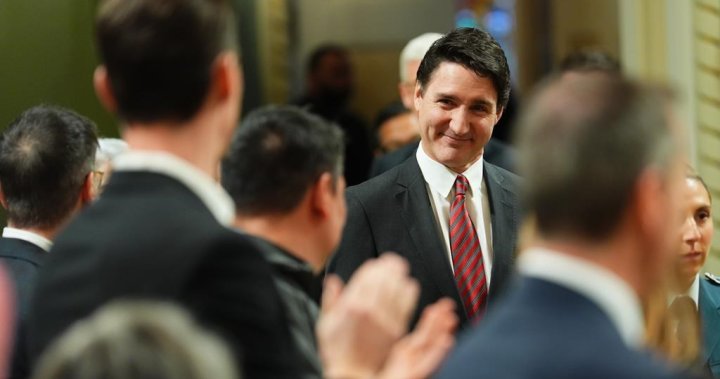Justin Trudeau has announced he will resign as Liberal party leader and prime minister once a new one is chosen in a leadership race, a move that comes after months of calls for him to do so from his own party.
Calls for Trudeau to resign from within his own party reached their highest levels in the past month following Chrystia Freeland’s resignation from cabinet as finance minister and deputy prime minister.
You can read the transcript of his remarks here.
So how did Trudeau get here, and how long have the calls for him to resign been getting louder?
Trudeau faced months of mounting calls to resign
Calls for Trudeau to resign have been intensifying over the last six months.
Last week, at least two Liberal riding association presidents told Global News it was time for Trudeau to take the steps to resign, with Taiaiako’n–Parkdale–High Park chair Derek Raymaker warning the party was “threatened with oblivion” because Trudeau wouldn’t leave.
Quebec MPs were the last to join the calls in 2024, with Global News confirming they had called for Trudeau to step down, as first reported by iPolitics, following consultations during the holidays.
The year-end calls followed the news on Dec. 16 that Chrystia Freeland had announced her resignation from cabinet, a move that prompted the calls within the Liberal caucus to reach levels not seen in months or years past.
That same day, NDP Leader Jagmeet Singh said Trudeau should resign and though at the time he said “all options” were on the table, later in December he said his party would bring a motion of no confidence against the Trudeau government.
Less than a week after Freeland’s announcement, Ontario’s Liberal caucus called for Trudeau to go with more than 50 of the 75 MPs from the province meeting to talk about party leadership, as first reported by the Toronto Star and CBC News, and those details had largely been confirmed by Global News.

Get daily National news
Get the day’s top news, political, economic, and current affairs headlines, delivered to your inbox once a day.
Michael Coteau, the caucus chair, was charged with communicating the contents of the meeting to Trudeau in hopes he’d make a quick decision to leave.
At the same time, a letter dated Dec. 23 and shared on Facebook saw the Atlantic Liberal caucus call on the prime minister to step down.

At a Liberal caucus meeting in late October, following the loss of a stronghold Montreal-area riding in a byelection on top of the loss that summer of the Toronto-St Paul stronghold, Trudeau was given a letter by 24 MPs asking him to resign and giving him a deadline to respond.
He told these MPs he would reflect on what they had to say, but a day later told reporters he would remain as leader.

Backbench Liberal MP Wayne Long told The Canadian Press after Trudeau’s decision that they continued to push for a secret ballot, and both he and former environment minister Catherine McKenna had called earlier that summer for Trudeau to resign as well.
Former British Columbia premier Christy Clark also said in October that she wanted to be “part of the conversation” around the future of the federal Liberals if Trudeau were to step down.
Her statement did not call for Trudeau’s resignation but came as he was facing those mounting calls.
In mid June, ahead of a byelection in Toronto-St. Paul, Ipsos polling exclusively for Global News showed 68 per cent of Canadians wanted Trudeau to step down.
What about older calls to resign?
Trudeau has also faced calls from political opposition parties to resign in the past.
Sen. Percy Down, a former chief of staff to ex-prime minister Jean Chretien, wrote in November of 2023 that the party should find a new leader to replace Trudeau. He was a Liberal senator until Trudeau ejected all senators from the party’s caucus.
He applauded the prime minister for helping the party recover after a historic 2011 defeat but said the “lack of fiscal responsibility” by the Trudeau government has given the opportunity for a government run by Conservative Leader Pierre Poilievre.
He urged the party to find a leader that could bring the party “back to the centre of the political spectrum” to ensure their chance of being reelected.

In 2020, then-Conservative leader Andrew Scheer was joined by Bloc Quebecois Leader Yves-Francois Blanchet in calling for resignation as Trudeau faced intense scrutiny over awarding the WE Charity a contract to administer a summer grant program for students struggling amid the COVID-19 pandemic.
The WE Charity at the time confirmed Trudeau’s mother and brother had been paid a combined $282,000 between 2016 and 2020 by the organization for separate speaking events.
The charity would have received $43.5 million from the federal government to administer the $900-million program.
It was eventually scrapped, but it prompted an investigation into a possible conflict of interest violation by Trudeau and then-finance minister Bill Morneau, whose daughter had worked for the group.
In 2019, Scheer had also urged Trudeau to resign following what the then-Conservative leader called troubling testimony by former attorney general Jody Wilson-Raybould during what became known as the SNC-Lavalin scandal.
Trudeau, however, had rebuffed that call.
—with files from Global News staff and The Canadian Press
© 2025 Global News, a division of Corus Entertainment Inc.



